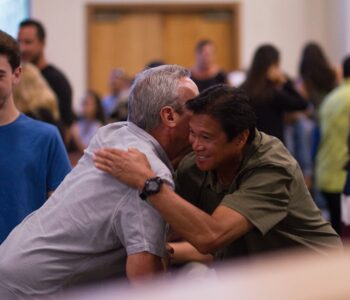 Blog
Blog
Five Distinctives of Being the Church
A Hope for the Helpers Blog
by Kent Denlinger
Earnest Southcott, an Anglican priest, wrote, “The holiest moment of the church service is the moment when God’s people—strengthened by Word and Sacrament—go out of the church door and into the world to be the Church. We don’t go to church; we are the church.” We understand the church not to be a building but people. Despite this knowledge, however, our thinking easily slides into seeing the church as an organization. Often, we choose a church based on its structure and provisions, or we choose to forego the experience of church altogether because of our disappointments. But for the sake of this article, let’s think of church less as an institution and more as people, specifically who we are.
As a pastor, I was occasionally asked what defined our church. I would sometimes rattle off a litany of distinctives we had discovered together over the years. These truths were not peculiar to our group, but neither were they common for most. Repeatedly unearthed in conversations was a constant theme of discouragement that led to disillusionment, even disengagement.
Such disengagement with the church is not going away. That has led me to personalize my understanding of the church and what it should look like. I now prefer to consider what should characterize us – me and you – not the organization, for as Southcott rightly points out, we are the church. Daniel Taylor, author of a book entitled The Skeptical Believer, accurately states that “all legitimate criticism of the church is self-criticism….”
Perhaps as we think about the church, we need to think less about what an organization is or isn’t and more about who we are as God’s people. Perhaps the distinctives I, along with a group of people, discovered years ago should characterize not an organization but rather the individuals who make up that organization we sometimes call church.
What then are these essential distinctives? Here is the first: be people of authenticity. Live honestly, embracing both our sinfulness and our saintliness. Be truthful about the difficulties of faith, including our doubts and fears. Rejoice over our victories, both big and small, all because we believe in a big God who can handle the totality of who we are. We should be able to talk about our failures as if we are not surprised. We should equally speak out of gratitude for where we see God’s life and love ooze out of our beings.
Second, we must normalize struggle and suffering. I read once where every book in the Bible, save one, either speaks directly to or implies suffering. The struggle with our flesh continues. It’s not going away. We live as fallen people in a fallen world. We live between the way it was (Genesis 1 & 2) and the way it will be (Revelation 21 & 22). Because we do, suffering and struggle will exist in us and around us till we die, or God sets it to rights.
Honoring brokenness is another essential distinctive. Larry Crabb wrote, “Remember what brokenness is. It’s the awareness that you long to be someone you’re not and cannot be without Divine help.” We should not be surprised by our sin, neither its pervasiveness nor its insidiousness. The Apostle Paul called himself “chief sinner” toward the end of his life not just because he knew what he was capable of, but because he also knew what was true in his interior world. As I understand it, brokenness over sin was the catalyst that fueled a recent “revival” at Asbury University.
Fourth, we must live thirsty. There are many opportunities to alleviate our thirst or to wrongly believe it can be satiated by a better church, better friends, or more activity. It’s my job and it’s your job to help each other rightly identify our thirst as being for God and to remain thirsty until we are home. Thirst is the last identifiable characteristic of God’s people(Rev 22:17). It’s our ticket home.
Last, we must rightly understand maturity as a greater awareness of our sinfulness that leads to an even deeper appreciation of God’s mercy and grace. If we do, we will become the community of the forgiven who therefore worship out of deep gratitude. It is sincere, humble worship that allows the Spirit to transform us. We are not changed by our efforts. We are not changed by more discovery of the intricacies of our dysfunctional lives. Instead, we are changed as we grow more in love with Jesus and the wonder of a Father God who knows us and still invites us into His love.
Let’s be the church, and, as we honor the right things, we might even impact our church organizations ever so slightly. We are the church!
Kent Denlinger served as a lead pastor of Valley Springs Fellowship in Warsaw, Indiana for 32 years. For the past 15 years, he has also worked for NewWay Ministries as a spiritual director at the School of Spiritual Direction and NextStep. After retiring from the pastorate in 2018, Kent has worked as a corporate chaplain for a pharmaceutical company in Cincinnati, Ohio. Kent has a Masters in Counseling degree as well as a Master of Divinity degree, both from Grace Theological Seminary. In 2010, he completed a Doctorate of Ministry in Spiritual Direction from Gordon-Conwell.
Kent is married to Karla, and they have two adult children and two grandchildren. Their friendship with Larry & Rachael Crabb extend back 35 years. Not only did Kent train under Dr. Crabb, he considers Larry a personal mentor over that same period of time. Kent has been described as a relationally gracious person who enjoys coming alongside people in the natural, ongoing journey of life, helping the individual discover what the Spirit of God is up to in his or her soul.